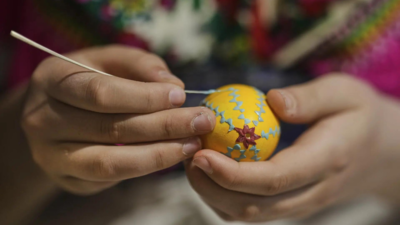Easter Egg Decorating: A Cherished Sorbian Tradition Endures in Germany

In the eastern part of Germany, the small yet vibrant Sorbian community is dedicated to preserving a delightful and intricate tradition: the art of decorating Easter eggs. This practice, which dates back to the Middle Ages, is not merely about aesthetics; it carries profound symbolic meanings that resonate through generations. The eggs, meticulously adorned with wax using either needles or goose quills, are rich in cultural significance, often symbolizing values like diligence and a good work ethic.
In Schleife, a picturesque town located just a short 16 kilometers (approximately 10 miles) from the Polish border, Anke Hanusch passionately engages in this age-old craft. As she skillfully dips her needle into dark blue wax, she carefully dots the wax onto a yellow-dyed Easter egg cradled in her hand. The rhythmic motion of transferring wax to egg and back again results in the emergence of a beautiful honeycomb pattern. This particular design holds special meaning, as these eggs are traditionally gifted from godparents to their godchildren, imparting blessings of diligence and a strong work ethic.
The art of egg decorating is a cherished element of the culture of the Sorbian ethnic minority, whose roots can be traced back about 1,500 years to Slavic tribes that settled in Central and Eastern Germany. Today, approximately 60,000 Sorbs reside in Germany, primarily divided between the federal states of Saxony and Brandenburg. For the Sorbian people, Easter stands as the most significant holiday of the year, a time when families reunite and celebrate their heritage. Stephanie Bierholdt, an enthusiastic employee at the Sorbian Cultural Center in Schleife, emphasizes this sentiment, stating that Easter is a time for Sorbs to return home and connect with loved ones. The best thing is that this tradition is still alive in families, she remarked with pride.
On April 6, just two weeks before Easter, Hanusch and her fellow artisans gathered at the cultural center to honor their rich heritage. They showcased not only their beautifully decorated eggs but also traditional folk costumes, songs, and dances that reflect their unique cultural identity. The practice of Sorbian egg decorating has roots that date back to the Middle Ages, showcasing the communitys deep connection to their history.
The artisans at the event, including Hanusch, were adorned in vibrant traditional attireHanusch wore a striking red folk costume and bonnet, a symbol of her unmarried status, as married women typically wear green. More than 30 artisans participated, showcasing their exceptional skills and creativity. Prices for these unique creations ranged dramatically, starting at 7 euros (approximately $7.72) for a decorated chicken egg, and reaching up to 90 euros ($99.28) for an intricately painted emu egg. The time it takes to create these masterpieces can vary significantly, ranging from 90 minutes to as much as six hours, depending on the complexity of the technique and the size of the egg.
Despite ongoing challenges, such as the global bird flu outbreak that has led to an egg shortage and increased prices, the artisans remain hopeful. They assert that their traditional rituals have not yet been hindered by these issues, although they emphasize the importance of sourcing eggs directly from farmers rather than relying on supermarkets. Hanusch, who is proud of her Sorbian heritage on her father's side, is also actively learning the Slavic language, further deepening her connection to her cultural roots.
From a young age, Sorbian children are introduced to the art of egg decorating, often starting as early as two years old, when they can first grasp a pencil. Many youngsters participate in this practice primarily during the Easter season throughout their childhood. However, Hanusch has continued to hone her skills over the years and now takes on the role of a teacher, sharing her knowledge with others, including her niece. I think its a valuable cultural asset that needs to be preserved, she asserted passionately. It would be a shame if it were to become extinct.


















